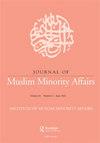美国穆斯林警察观念的实证评价
IF 0.4
0 RELIGION
引用次数: 4
摘要
摘要本文评估了美国穆斯林对警察的看法。关于对警察和穆斯林社区的研究,大部分重点都集中在评估警察对穆斯林社区的看法上。对警察的态度反映了少数民族社区警察合法性的一个重要衡量标准。目前的研究分析了来自便利样本(N = 142)。我们对第一代和第二代美国穆斯林的t检验分析发现,他们对警察的态度没有显著差异。然而,我们的OLS回归模型表明,教育、对因种族、族裔或宗教而受到负面待遇的恐惧、对受害的恐惧、负面媒体描述和社区因素显著影响了对警察的看法。本文章由计算机程序翻译,如有差异,请以英文原文为准。
An Empirical Evaluation of American Muslims’ Perceptions of the Police
Abstract This paper evaluates American-Muslims’ perceptions of the police. With regard to studies of the police and Muslim communities, much of the focus has centered on evaluating police officers’ perceptions of the Muslim community. Attitudes toward the police reflect an important measure of police legitimacy for minority communities. The current study analyzes responses from a convenience sample (N = 142) collected from around the United States. Our t test analysis of first-and-second generation American Muslims found no significant differences between attitudes toward the police. However, our OLS Regression models suggest that education, fear of negative treatment due to race, ethnicity, or religion, fear of victimization, negative media portrayal, and neighborhood factors significantly affected perceptions of the police.
求助全文
通过发布文献求助,成功后即可免费获取论文全文。
去求助
来源期刊

Journal of Muslim Minority Affairs
RELIGION-
CiteScore
1.40
自引率
0.00%
发文量
31
期刊介绍:
Journal of Muslim Minority Affairs is a peer reviewed research journal produced by the Institute of Muslim Minority Affairs (IMMA) as part of its publication programme. Published since 1979, the journalhas firmly established itself as a highly respected and widely acclaimed academic and scholarly publication providing accurate, reliable and objective information. Journal of Muslim Minority Affairs provides a forum for frank but responsible discussion of issues relating to the life of Muslims in non-Muslim societies. The journalhas become increasingly influential as the subject of Muslim minorities has acquired added significance. About 500 million Muslims, fully one third of the world Muslim population of 1.5 billion, live as minorities in 149 countries around the globe. Even as minorities they form significant communities within their countries of residence. What kind of life do they live? What are their social, political and economic problems? How do they perceive their strengths and weakness? What above all, is their future in Islam and in the communities of their residence? The journal explores these and similar questions from the Muslim and international point of view in a serious and responsible manner.
 求助内容:
求助内容: 应助结果提醒方式:
应助结果提醒方式:


